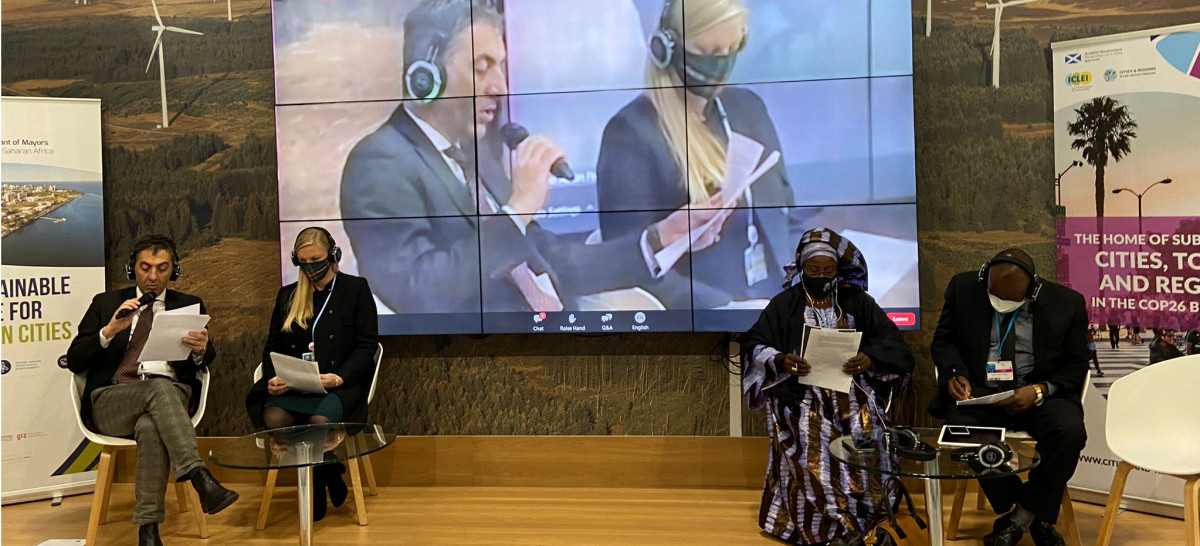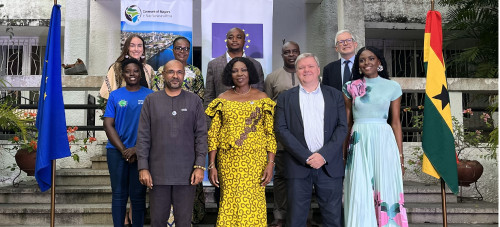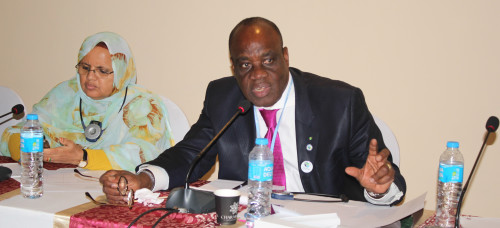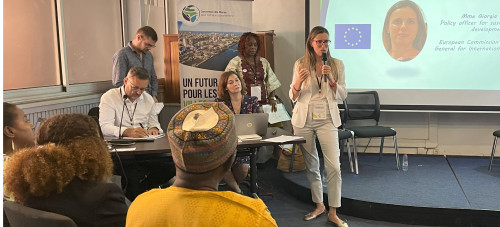Were African voices really heard at COP26?
Published: 30 Nov 2021

In the run-up to COP26, the common belief was that this COP would only succeed if Africa was at the heart of the negotiations. In order to put the spotlight on African voices at COP26, CoM SSA hosted one of the few sessions where African mayors could have their say. However, as we reflect on this much-anticipated event, it is apparent that Africa was not only under-represented at COP26 but that the continent’s priorities are not fully represented in the final agreement, called the Glasgow Climate Pact.
The Local Governments and Municipal Authorities (LGMA) constituency fielded over 400 delegates, including mayors, governors and councillors, from across the world, making it the second-largest delegation, as compared to national delegations. Included in this delegation were two Covenant of Mayors in Sub-Saharan Africa (CoM SSA) signatory mayors and several local government representatives who attended the conference in person. Since 1995, ICLEI has been the focal point of the LGMA which has represented networks of local and regional governments at the processes under the United Nations Framework Convention on Climate Change (UNFCCC) since the first Conference of Parties (COP).
The LGMA and the Scottish Government hosted the Multilevel Action Pavilion in the Blue Zone of COP26 to bring the voices of cities' and regions' to the negotiations. Logistical challenges in the wake of the COVID-19 pandemic meant that many African local government leaders were unable to travel to Glasgow for the in-person event. Although COP26 was a hybrid event, persistent connectivity issues made it difficult for African representatives to connect online.
Representation matters
Africa contributes the least to total global greenhouse gas (GHG) emissions, only about 4 percent, but it is the most vulnerable continent to the impacts of climate change. At COP26, African leaders, in limited numbers, appealed for support. These leaders called for local-level climate finance to be unlocked, an increase in funding for adaptation projects, and drastic emission cuts from the Global North. But despite urgent calls, few of these requests feature in the Glasgow Climate Pact.
The Paris Agreement urged developed nations to scale up their financial support with a concrete roadmap to achieve the goal of jointly providing USD 100 billion annually by 2020 for mitigation and adaptation. This pledge, however, has not been upheld. The Glasgow Climate Pact urges developed countries to deliver on the USD 100 billion goal urgently and through to 2025. Without a concrete commitment on how these funds will be mobilised, this presents a further setback to urgent, meaningful climate action in Africa.
Another disappointing outcome was on loss and damage, “the collective term for the societal and financial costs of climate impacts that can no longer be avoided in the most vulnerable nations.” Cities are on the frontlines of the impacts of climate change and are already facing these associated costs. National governments have been asked to enhance their commitments by COP27 in Egypt in 2022, and CoM SSA and African cities will continue to advocate to national governments on the urgency of more support for cities.
Local governments advocate for multilevel governance
After the draft Glasgow Agreement was released, local governments were quickly mobilised – speaking to their respective national governments and advocating through national and regional associations – for stronger language around the need for multilevel collaboration. Several mayors and local government representatives, including CoM SSA signatory the Governor of Kisumu County in Kenya, were invited to meet with the United Nations Secretary-General and share their views on the importance of this text. This is why it is so key to ensure the representation of African cities at COP.
In the end, the Glasgow Climate Pact incorporated the language that the local governments, through the LGMA, advocated for around the urgent need for multilevel and cooperative action– it also included unprecedented language that is more inclusive to local governments, indigenous groups, the youth and other vulnerable groups. The final agreement also included commitments to phasedown fossil fuels, a more holistic approach of climate action that incorporates nature-based solutions, and other agreements to uphold the “Paris Agreement goal of holding the increase in the global average temperature to well below 2 °C above pre-industrial levels and pursuing efforts to limit the temperature increase to 1.5 °C above pre-industrial levels.”
The agreement, however, is just a building block, as Director-General for Climate Action at the European Commission, Mauro Petriccione, said, “Seizing these opportunities is by no means guaranteed upfront, and will require close monitoring and significant investments, as well as international cooperation and, where necessary, diplomatic pressure. But, if we look at the entire package that 197 countries agreed on, the glass is more than half full.”
CoM SSA at COP26
In order to provide a platform for African voices, CoM SSA hosted a hybrid session at COP26 in the Multilevel Action Pavilion in the first week of COP26. The event saw the European Commission, African mayors and other stakeholders share their thoughts on what is needed to fast-track climate action and protect vulnerable communities in the region. One of the key themes that emerged in this session was strengthening multilevel governance.
This session showed that African cities are already making strong commitments and acting on them through innovative approaches. There is a keen focus on climate adaptation and building resilience as well as unlocking finance, all of which are key to accelerating climate action in urban Africa.
CoM SSA signatories shared actions they are taking on the ground to build more resilient and sustainable local governments and how the support of CoM SSA has helped them on this journey.
Lord Mayor Erias Lukwago, Kampala Capital City Authority: “We have developed a number of veritable programmes to deal with this global challenge. We have the Kampala Climate Change Action Plan, which was designed way back in 2016, and right now we are at the implementation stage – we have developed a number of bankable projects which await facilitation from different partners.”
CoM SSA is a major catalyst for local climate action in the sub-Saharan Africa region focused on moving from planning to implementation.
First Deputy Mayor Camara Fatimata Traoure, Bamako, explains the District’s journey with CoM SSA: “In July 2021, the District of Bamako officially launched the development of its Sustainable Energy Access and Climate Action Plan (SEACAP). All the conditions are now in place to enable the city of Bamako to adopt a sustainable strategy integrating climate issues by 2030. The District will work on preventing climate risks, improving the quality of basic services and strengthening adaptation capacities.”
At COP26 CoM SSA launched a new evidence-based report titled, Data Talks: What data do local governments really need to plan effectively for climate change?
In the second week of COP26, the Global Covenant of Mayors was awarded the Gulbenkian Prize for Humanity along with the EUR 1 million prize money to finance projects in sub-Saharan Africa. At the award ceremony, the Governor of Kisumu County, on behalf of CoM SSA, spoke on a panel with Frans Timmermans, Co-chair of the GCoM and Executive Vice President of the European Commission responsible for the Green Deal, representatives from the Gulbenkian Foundation and other speakers.
Governor of Kisumu County, Prof. Peter A. Nyong’o: “Funds will be used to help Garoua and other cities in Sub-Saharan Africa go beyond their climate plans and put in place sustainable projects that will help their populations.”
The Mayor of Garoua, who will be receiving some of the funds, thanked the Gulbenkian Foundation via a video message which was played at the event.
Though COP26 did not reflect Africa’s priorities to accelerate climate action on the continent, the work must continue as UN Secretary-General António Guterres said: “I know you are disappointed. But the path of progress is not always a straight line. Sometimes there are detours. Sometimes there are ditches. But I know we can get there. We are in the fight of our lives, and this fight must be won. Never give up. Never retreat. Keep pushing forward”.





